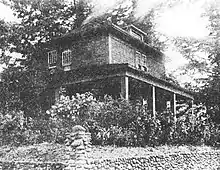James A. Merriman
James A. Merriman (October 10, 1869 – December 14, 1946) was an American physician and newspaper publisher. Merriman was the first African American physician to practice medicine in Portland, and perhaps the first in the state of Oregon; he was recruited to care for Black workers of the Union Pacific Railroad in 1903. He was a cofounder of Portland's second Black newspaper, The Advocate, and edited The Portland Times from 1913 until 1926. Merriman was also active in civil rights and community leadership, serving as the first president of the Portland chapter of the NAACP.
James A. Merriman | |
|---|---|
.jpg.webp) | |
| Born | 10 October 1869 Camden |
| Died | 14 December 1946 Provident Hospital |
| Alma mater | |
| Occupation | Physician, newspaper proprietor |
Early life and education
J. A. Merriman was born October 10, 1869, in Camden, Alabama.[1] His parents were John Merriman, a farmer from Alabama, and Georgia Burke, from South Carolina.[1][2]
He attended Talladega College, graduating in 1891.[3] Merriman received his M.D. from Rush Medical College in Chicago in 1902.[1][4] He was the only Black graduate from Rush Medical College that year.[2]
Career as a physician
Merriman came to Portland in 1903 where he passed the Oregon medical examination in June and started practicing medicine in Portland that August, becoming the first African American physician in the city.[1][5][6] Merriman may have been the first African American physician in Oregon.[2][3] He was recruited to Portland by the Union Pacific Railroad which required a Black physician to care for its Black workers, who were employed as porters, stewards, cooks, and barbers.[7][2]
By 1910, he had joined his practice with Dr. Stanley Lucas.[6] Merriman recruited Black physician DeNorval Unthank to Portland to take his place caring for Black workers of the Union Pacific.[8]
Merriman moved to Phoenix, Arizona in 1931, leaving Unthank as the only Black physician remaining in Portland.[7] He practiced as a physician in Phoenix for fourteen years.[9]
Newspaper work
Along with other local Black entrepreneurs, Merriam cofounded Portland's second Black newspaper, The Advocate, in 1903.[10] Merriman was also the editor of The Portland Times, an African American newspaper, and served as Vice President of the Times Publishing Company.[6][11] He would work in the role of editor from the founding of the Times in 1913 until 1926.[2]
Civil rights and community leadership
Merriman was the first president of the Portland branch of the NAACP, which was founded in 1914.[10] With Merriman in a leadership role, in 1915 the Portland NAACP convinced the Portland City Council to ban the showing of any film promoting racial hatred (after the council members watched The Birth of a Nation).[12]
During World War I, he was appointed as a Four Minute Man and was enrolled as a member of the Volunteer Medical Service Corps.[3]
While living in Portland he was heavily involved in the community, moderating local forums, directing church plays, and serving as the president of a literary society.[2] He was a member of the Mystic Shriners, Knights of Pythias, and a thirty-second degree Mason.[1] He was also chairman of the trustee board of William H. Patterson Elks Lodge in Phoenix, and helped plan the building of the Elks lodge building at 1007 South Seventh Avenue, which was finished a few months before his death.[13]
Personal life and death

Merriman was married to Mabel Jones; they had two children together, Robert E. and Louise (Coles).[1]
Merriman was ill the last year of his life, and in September 1946 he was moved from his home in Phoenix to his daughter's home in Chicago.[9] He died at the Provident Hospital in Chicago on December 14, 1946.[13]
References
- Who's Who in the Northwest. Western Press Association. 1911. Retrieved February 25, 2022.
- "The Register: J.A. Merriman". KMUN. August 6, 2021. Retrieved February 26, 2022.
- "Portland Times Annual". Portland Times. Times Publishing Company. August 2, 1919. Retrieved February 26, 2022.
- "1902 Graduating Class (B), Rush Medical College [class photo]". CARLI Digital Collections. Retrieved February 26, 2022.
- "24 Years Ago". The Advocate. Portland, Oregon. September 3, 1927. Retrieved February 26, 2022.
- Millner, Darrell; Abbott, Carl; Galbraith, Cathy (August 1, 1995). "Cornerstones of Community: Buildings of Portland's African American History". Black Studies Faculty Publications and Presentations. Portland, Oregon: Bosco-Milligan Foundation. Retrieved February 26, 2022.
- Piasecki, Sara (January 20, 2022). "DeNorval Unthank (1899-1977)". Oregon Encyclopedia. Retrieved February 25, 2022.
- "Oregon's Struggle for Racial Equity". Portland Observer. February 24, 2021. p. 13. Retrieved February 26, 2022.
- "Dr. J. A. Merriman Moved to Chicago". Arizona Sun. September 13, 1946. Retrieved February 25, 2022.
- The History of Portland's African American Community (1805 to the Present). February 1993. Retrieved February 26, 2022.
{{cite book}}:|website=ignored (help) - "National Register of Historic Places Multiple Property Documentation Form: African American Resources in Portland, Oregon, from 1851 to 1973" (PDF). City of Portland. April 2020. Retrieved February 26, 2022.
- Oregon Black Pioneers; Moreland, Kimberly Stowers (2013). African Americans of Portland. Charleston, South Carolina. p. 40. ISBN 9780738596198. Retrieved February 26, 2022.
{{cite book}}: CS1 maint: location missing publisher (link) - "Dr. J. A. Merriman Dies In Chicago". Arizona Sun. December 20, 1946. Retrieved February 26, 2022.
External links
- "J.A. Merriman" 5-minute audio episode of The Register, from National Public Radio station KMUN (August 6, 2021)